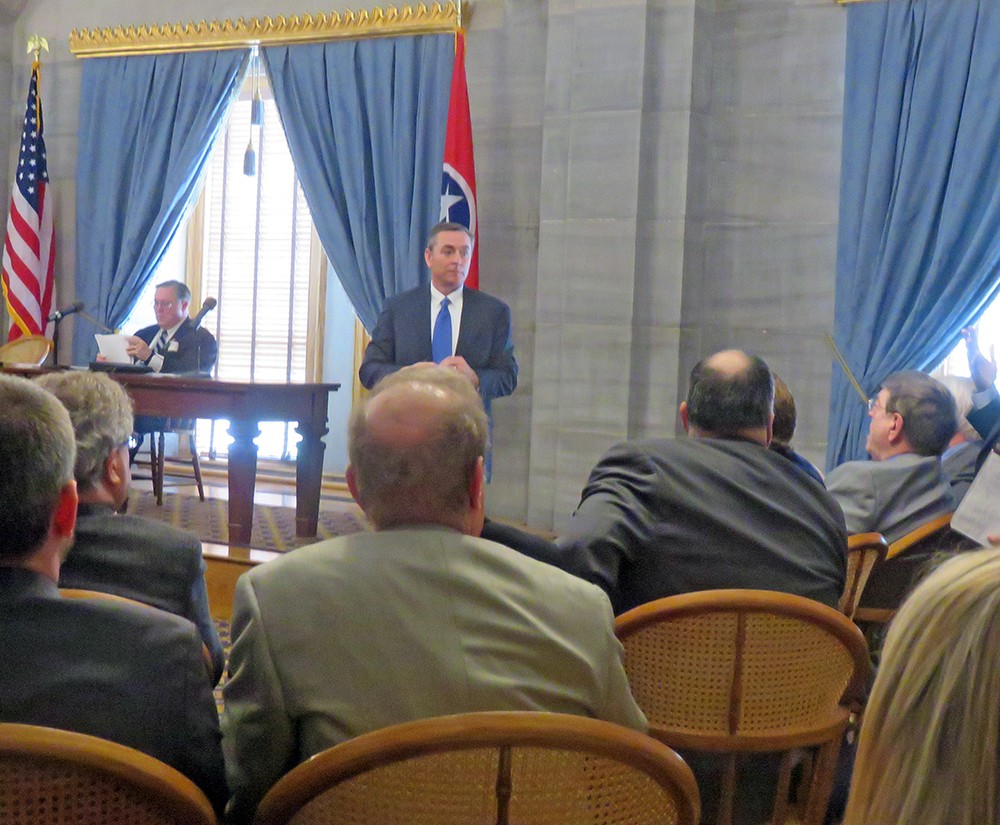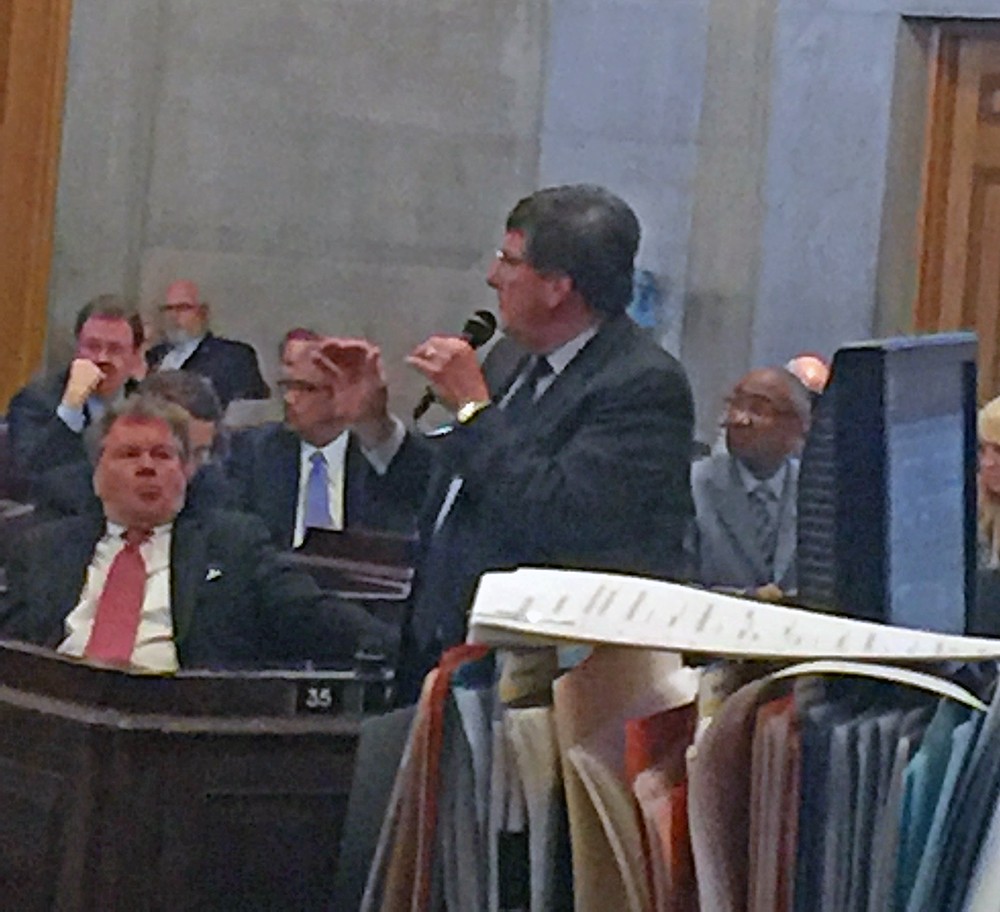NASHVILLE — One of the last points of contention between factions of the Tennessee legislature concerned HB 2156/SB 1796, a bill to amend the state’s property tax relief program for the elderly and disabled veterans.
News got around about an amendment to the House version of the bill filed by the minority House leader, Craig Fitzhugh (D-Ripley), that would restore cuts made in the previous year to the relief amounts available. In effect, the beneficiaries would enjoy the state’s sanction for avoiding a considerable amount of the property taxes they might otherwise be liable for.
This was a policy issue, and a volatile one, inasmuch as — with the interests of veterans and, ipso facto, the issue of patriotism, involved — the pros and cons did not divide along specific party lines. Both parties held caucuses Thursday morning, and the Republicans were focused explicitly on what to do about the Fitzhugh amendment, which, if made subject to a roll call vote, would create potential embarrassments at election time.
Which is to say, it was a politics issue, as well. Not for the first time, two chief ingredients —politics and policy — would be ground together in a legislative sausage.
GOP caucus chair Glen Casada (R-Franklin) moderated his party’s discussion and, after about an hour of it, summed up what he saw as four alternatives, involving such possibilities as moving to defer the issue for a year and substituting their own version of the Fitzhugh amendment. In the end, there was no agreement on a particular strategy, just a determination to neutralize, one way or another, what Fitzhugh had in mind.
Say what you will about the frankly self-serving aspect of the GOP caucus session, it was held in broad daylight, with media admitted. When the Democrats got ready to do theirs, caucus chair Mike Stewart (D-Nashville) announced that it  JB
JB
Casada in the GOP causus
would be held “in private,” though he later acknowledged that the Democratic discussion was a mirror image of the Republican one, devoted almost entirely to the matter of how to keep the Fitzhugh amendment alive and a matter of well-noted public record.
When the House convened to hear the issue, neither set of partisan motivations got much mention, of course.
Rep. Bill Dunn (R-Knoxville), chairman of the House Calendar and Rules committee and a budget hawk, invoked both parliamentary and parimonious motives in maintaining that the Fitzhugh amendment would set a wrong precedent, in being submitted directly from the floor rather than in committee and that it might risk disrupting budget allocations already approved. Other Republicans had similar sentiments.
Fitzhugh and other Democrats objected on the basis of a higher obligation to the interests of the veterans and the elderly. Rep. Antonio Parkinson (D-Memphis), an ex-Marine, took this position to its rhetorical apex. “I’m trying to control myself…That we are even having this discussion! Why are we talking about it?” He contrasted the sacrifices of life and limb on the part of the state’s veterans with the evident determination of “the elite of our state…to eat and eat and eat” from the trough of special privilege.
There was more from both sides of the issue, most of its repetitious , and several attempts to end discussion failed of approval. House Majority Leader Gerald McCormick (R-Chattanooga) wandered over to the press cubiicle at one point, wearing a wicked grin. “How’s the Godless atheist caucus?” he jested, then opined wearily, in the manner of a co-conspirator,. “This stuff could go on all night! “
At a given point, it became obvious that enough Republicans — Rep. John Ragan (R-Oak Ridge), Rep. John Forgety (R-Athens), and assorted others, veterans themselves in the main — were prepared to support Fitzhugh.
There ensued a quick sleight of hand, whereby a quick vote of approval for the Fitzhugh amendment by voice vote came and went — so quickly that Democratic caucus chair Stewart missed it, and, once he became aware of it, denounced it as “trickery.” The issue here was clear: he had been cheated of his desire to see as many cost-cutting Republicans as possible go on the record as opposing veterans’ benefits.
Fitzhugh, in the true sense of the phrase, became the Man of the Hour. During the next 60 minutes or so, the bill, with his amendment attached, was shunted through the House Finance, Ways and Means Committee and the House  JB
JB
Fitzhugh bringing his amendment
Calendar and Rules Committee, where Rep. Ragan, official sponsor of the amended bill, professed himself satisfied with the House having come by “some pretty good sausage.”
“Yeah, but it’s sausage on a credit card,” groused Chairman Dunn.
In any case, it seemed to be a rare victory, both on political and on policy grounds, for Fitzhugh and the Democrats.
And predictably, late in the day came a press release from the indefatigable Ken Jobe, press secretary for the House Democratic Caucus. It was (talk about wearing your message on your sleeve!) entitled “Fitzhugh Restores Tax Relief for Disabled Veterans, Elderly from Republican Cuts.”
Fairly enough, it stated, “Previously, the state would pay tax on the first $175,000 of a veteran’s home and on the first $25,000 for elderly homeowners. But the new law lowered the limits to $100,000 for veterans. Elderly or disabled homeowners would be capped at $23,000. The [Fitzhugh} amendment restores the tax refunds to previous levels.”
And, by way of summing up, it attributed to Fitzhugh (a man of courtly eloquence in his own real-speak) the following boilerplate: “What Republicans did to our elderly and our disabled veterans last year was the absolute wrong move. Our disabled veterans and senior citizens have paid a great physical, mental and emotional price to ensure our liberties. Although we can never fully pay them back for what they have done for our communities, our state and our nation, we can make sure that we uphold our promise to assist with their property taxes.”
So forth and so on, and so far, so good. Yet, as the release acknowledged in its very last line, “The bill now needs to be reconciled with the Senate version.”
And, in fact, as the House would be informed late in the day, the JB
JB
Stewart (right) claiming ‘trickery’
Senate, arguably an even more rigidly GOP-dominated body, had declined to accede to three of the House amendments, including the one by Fitzhugh.
The House-Senate conference report, which was approved Friday morning, recommended, in no uncertain terms, “that all amendments be deleted.” And so they were.
Essentially, the report hewed to the Senate version of the bill, which kept most of the provisions found odious and austere in the unamended 2015 version, though it raised last year’s caps on untaxable property from $23,000 to $25,000 and suspended any reference to periods of service or income limits the for veterans newly admitted to the program.
This outcome kept spending levels constant with the amount, involving a modest increase in funding of just under a million dollars, appropriated in this year’s budget, and, though there was a good deal of back and forth, particularly from two dissenters — Rep. Ragan, a retired Air Force colonel, who votes with GOP conservatives on most issues but on this one sided with the Democratic position, and Rep. Karen Camper (D-Memphis).
In the end, Ragan abstained from approving the committee report, and Camper, a veteran herself, voted No. But it was a done deal. The only concession to the idea of upwardly revising the financial benefits for vets and the elderly was a consensus that the issue should be, and would be, revisited next year — though an amendment to that effect was rejected for lack of a motion in its favor from the Senate side.
That was not the finale, however. When the House got its chance to approve the conference report, Rep. Camper produced a minority report, with the Fitzhugh amendment restored. Miraculously, given the obvious desire of most members to get done with official business and get home, a motion to table her report failed.
There followed a recess, where the two caucuses quickly reconsidered things and evidently Camper’s balloon floated back to earth. Back in session, in any case, her report did get tabled, and, presumably because everyone realized it was awfully late in the game, the majority conference report — sans the Fitzhugh amendment — was readied once more for approval.
Camper, Ragan, Forgety and Rep. Eddie Smith (R-Knoxville) all expressed regrets, along with a compensatory claim that that, as Ragan said, they could take “half a loaf” (presumably the abolition of income and term-of-service limits) back home, and, as Forgety said, next year would bring another opportunity “to make our disabled veterans and disabled elderly whole.”
Before the vote was taken, Ragan advised members to vote their conscience and said, “I hope your conscience tells you that the sausage-making process we’ve been involved in is better than nothing.”
The vote came: 58 to 18 in favor. But there was, as all agreed, always next year.